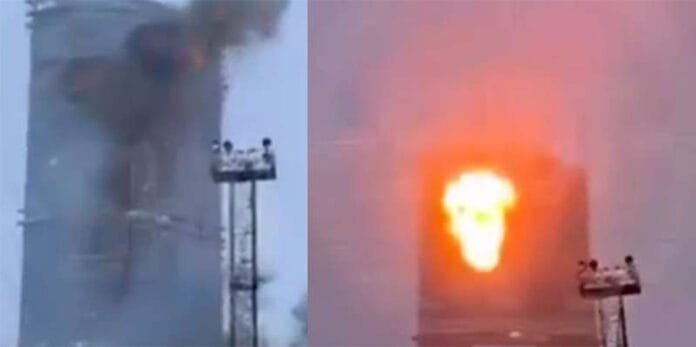The Russian city of Kazan faced a series of alarming drone attacks on Saturday, prompting concerns about escalating tensions in the region. According to reports, multiple drones struck three major buildings in the city, causing widespread panic and forcing authorities to take immediate action. The incident, which has drawn parallels to the infamous 9/11 attacks, is a stark reminder of the growing threat of drone warfare in modern conflict zones.
Kazan Under Siege: Details of the Drone Attacks
The drone strikes targeted residential high-rise buildings in Kazan, a city located approximately 800 kilometers east of Moscow. Eight separate drone attacks were reported, according to Russia’s aviation monitoring agency, Rosaviatsia. While no casualties have been confirmed, the damage to the buildings has left residents in shock.
Unverified footage shared by the Baza Telegram channel, which is associated with Russian security services, shows a drone colliding with one of the high-rises. The impact triggered a massive fireball, causing visible structural damage. This footage has been widely circulated on social media, further fueling fears of continued aerial threats.
Impact on Kazan’s Infrastructure
Following the attacks, Kazan’s airport was temporarily closed. The arrival and departure of flights were suspended, creating significant disruptions for travelers. Rosaviatsia confirmed that the closure was a precautionary measure in response to the threat posed by the drones.
The drone strikes also raised concerns about the security of Kazan’s infrastructure, particularly as the city prepares to host the 2024 BRICS summit. Known as Russia’s “third capital,” Kazan has been a prominent location for international events, including the 2018 FIFA World Cup.
Russia’s Accusations Against Ukraine
The Russian Defense Ministry has directly accused Ukraine of orchestrating the attacks. Officials described the strikes as a “grave mistake” by Ukraine, further intensifying the already volatile relations between the two nations. This comes amid the ongoing conflict that began on February 24, 2022, when Russia launched a full-scale military operation in Ukraine.
The ministry’s allegations have yet to be independently verified, but the timing of the attacks coincides with a series of Ukrainian counteroffensives targeting Russian territories. The use of drones in this conflict has escalated in recent months, highlighting the increasing reliance on unmanned aerial vehicles in modern warfare.
Strategic Importance of Kazan
Kazan holds significant strategic and cultural importance for Russia. As the capital of Tatarstan, it is a vital economic and transportation hub. The city is also home to numerous historic landmarks and is a key player in Russia’s international diplomacy, particularly with its upcoming role as the host city for the BRICS summit.
The drone attacks have cast a shadow over Kazan’s reputation as a secure and thriving metropolis. With the city being located about 1,400 kilometers from Kyiv, the incident underscores the expanding reach of the conflict into Russian territory.
Drone Warfare: A Growing Threat
The use of drones in warfare is not new, but their deployment in civilian areas marks a disturbing trend. These unmanned aerial vehicles are capable of causing significant damage while minimizing risk to the operators. In the Kazan attacks, the drones were reportedly aimed at densely populated residential areas, amplifying the psychological impact on residents.
Russia has previously faced drone attacks in other regions, but the scale and precision of the Kazan strikes represent an alarming escalation. Experts warn that such attacks could become more frequent as tensions between Russia and Ukraine continue to rise.
Government Response and Public Reaction
Russian authorities have pledged to investigate the attacks thoroughly and strengthen security measures in Kazan and other vulnerable regions. Local officials have urged residents to remain vigilant and report any suspicious activity.
Public reaction to the attacks has been one of fear and uncertainty. Many residents are questioning the effectiveness of current defense systems and the government’s ability to protect civilian areas from such threats.
The Broader Context of the Russia-Ukraine Conflict
The Kazan drone attacks are a stark reminder of the broader conflict between Russia and Ukraine, which has entered its second year. Since the invasion of Ukraine, Russian forces have faced increasing resistance, with Ukraine employing innovative tactics, including the use of drones, to counter Russian advances.
The war has led to widespread destruction in Ukraine, displacing millions and causing a humanitarian crisis. At the same time, incidents like the Kazan attacks highlight the conflict’s impact on Russian territory, raising questions about the long-term implications for regional stability.
















